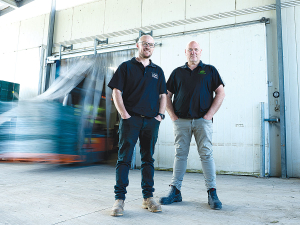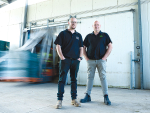Horowhenua farmer Cam Lewis is in the business of growing superb quality produce – milk, asparagus, and strawberries.
Lewis says a small, but environmentally important change to his refrigeration equipment is helping shore up smooth operations and delicious fresh food for years to come
Lewis is the manager of Lewis Farms and one of many farmers and horticultural managers who have worked with Dairy Technology Services (DTS) to swap out R404A refrigerant gas from dairy and packhouse chillers to the lower GWP refrigerant, R499A.
Lewis is fourth generation on the family’s Dunoon property between Foxton and Levin. As a multigenerational business, he says that they understand the need to look after the environment.
“We hope our family legacy will continue for years to come. We take a long view of looking after the environment and for us, it needs to make financial sense as well. The DTS R404A gas swap out ticks all the boxes.
“There’s no downside,” says Lewis. “Some people are driven by their environmental footprint. This obviously ticks that box. Some people are driven purely by financial metrics. Again, it ticks that box. Some people, like me, are driven by both.”
The R404A-R449A swap out scheme provides a changeover from R404A gas to R449A, a significantly lower impact gas. Eventually, 95% of gas leaks out – so when refrigerant leaks do happen, if units are charged with the newer R449A, the environmental impact is reduced by 67 percent.
On top of that, farming and commercial refrigeration systems, such as those operating in vineyards, breweries, fisheries, butcheries and horticultural operations, can improve energy efficiency up to 10% if they move to the lower impact gas. In turn, the lower power generation reduces emissions further.
“The move was an absolute no-brainer because we are moving to a more environmentally friendly gas. The old gas was incredibly expensive. Every time we had a gas leak and we had to buy more, it was eye-watering numbers. And the swap out itself was cost neutral, seamless and no risk.”
Gavin Thwaite, DTS chief says the interest to address climate impact is growing across business owners from the primary sector and every reduction counts towards a healthier planet and sustainable future.
In the first year of the R404A swap out campaign, DTS has extracted four tonnes of R404A – a gas considered one of the worst refrigerants in the country for greenhouse gas emissions.
Four tonnes of R404A leaking into the atmosphere is the equivalent to 10,000 tonnes of C02e or a diesel vehicle being driven 60 million kilometres.
“This gas-to-gas swap is one easy way business owners and operators can make a change. We’re confident that, this time next year, we’ll have retrieved at least another four more tonnes of gas removed from the supply chain. We’d like to see a figure much higher than that,” says Thwaite.
Industry reports estimate around 700 tonnes of R404A is circulating through New Zealand’s refrigerated cold food chain. DTS is open to work with government and other refrigeration and primary sector companies to make a more significant dent in New Zealand’s R404A store.
The company is also exploring new technical and manufacturing initiatives to accelerate these efforts to reduce reliance on harmful hydrocarbon gases across dairy and other parts of the cold food chain.

















